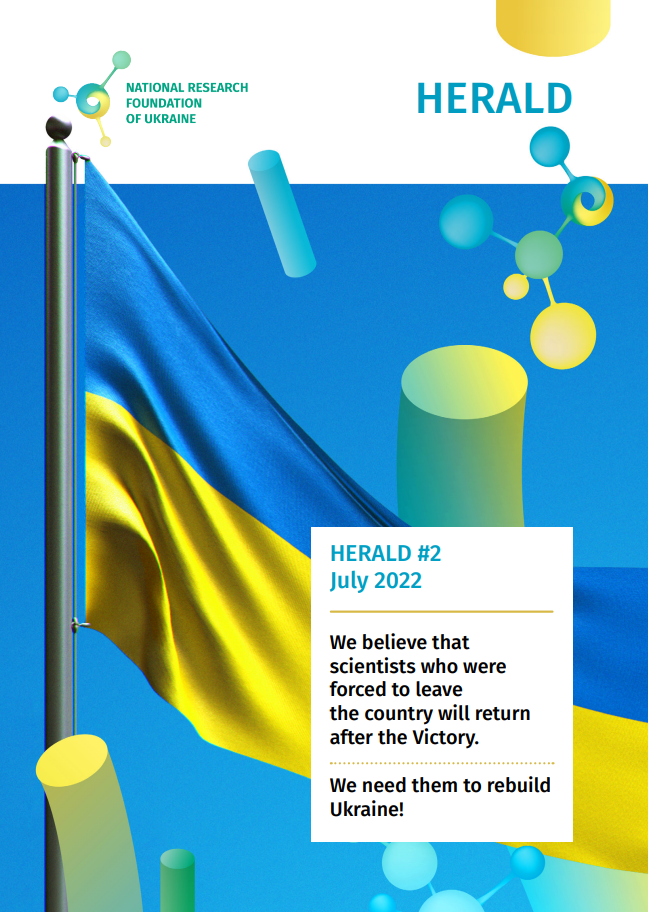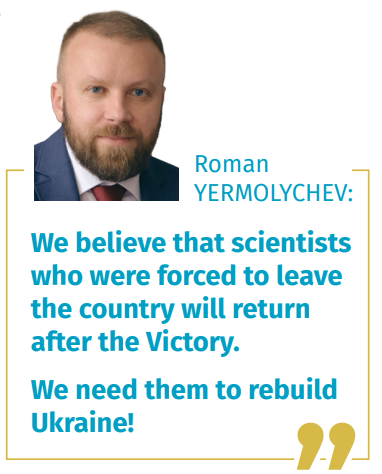
All of us believe in our Victory and are confident that we will protect the territorial integrity and independence of Ukraine. But we also understand that after the war is over we will have to work hard to rebuild the country’s economy. Specialists of all professions, including scientists, will have to join the recovery.
How should science be funded after the war? What are the advantages of grant funding? How to ensure the implementation of crucial scientific developments for the reconstruction of the country?
We asked these and other questions to the Deputy Minister of Finance of Ukraine Roman Yermolychev.
– Roman Volodymyrovych, what advantages do you see in financing science on the competitive basis compared to other methods of financing? Why is this important today, during the war?
–According to the current legislation, budget financing of research and technical activities at the expense of the State Budget is aimed at ensuring the main activities of state research institutions and scientific research of universities, academies, institutes, as well as the implementation of specific research and technical programs and projects, and providing grants.
For the Ministry of Finance it is extremely important that the funds allocated to national research are used rationally, and that research conducted in Ukraine has practical value for the development of all areas.
Funding of research on the competitive basis provides an opportunity for research institutions, regardless of their departmental subordination, to receive grant support for the implementation of research, scientific and technical (experimental) developments.
The advantages of this approach are financing of research on the competitive basis. It means that the most relevant, interesting, and important projects for Ukrainian society receive funds, and therefore, state resources work efficiently.
That is why competitive financing of scientific activities through the National Research Foundation of Ukraine is the right step in the direction of creating a competitive environment in the field of research because it allows to focus on a specific result and integrate Ukrainian research into the global scientific area.
To ensure the activities of the National Research Foundation of Ukraine and its grant support provision in 2022, funds in the sum of about UAH 834 million were allocated in the State Budget of Ukraine, which would exceed expenditures of 2021 by 25.1%.
Unfortunately, these plans cannot be implemented because of the war. In connection with the imposition of martial law in Ukraine, there was a need for priority and prompt resolution of urgent state issues, in particular aimed at ensuring the financial stability of the country’s economy, operational provision of high-quality medical services, meeting the needs of the security and defense sector, etc.
Given this, expenditures of the general fund of the State Budget were reduced by the relevant decisions of the Government, in particular funds that were allocated to the National Research Foundation for the provision of grant support were directed to the repulsion of the armed aggression, ensuring the inviolability of the state borders and state protection, and implementation of territorial defense and public safety measures.
It is vital today to ensure a review of the priorities of expenditures and their rational use, taking into account the real needs.
Regarding the financing of research, scientific and technical activities, it should be mentioned that the available financial resources should be directed to the implementation of priority and relevant research, scientific and technical (experimental) developments which envisage creation and implementation of innovative competitive research and technical products.
Today, the working group on education and science of the National Council for the Recovery of Ukraine from the War prepares proposals with specific measures, in particular regarding the priority areas of research development and involvement of alternative sources of funding for research (donor funds, international technical assistance).
We believe that under such conditions the competitive system of grant funding will contribute to the concentration of budget funds on implementation of promising research and will prevent their dispersion.
–The outflow of early-career researchers abroad is one of the consequences of the long-term underfunding of science (for ten years, the number of young researchers at the NAS had almost halved, as of the end of 2020, only 2.082 young researchers worked in the scientific institutions of the NAS of Ukraine, among them 48 Doctors of Sciences (DSc) under the age of 40). Is this situation changing? And do researchers who left our country after the start of the armed aggression have any motivation to return?
When it comes to funding research in Ukraine, everyone is used to talking about imaginary scientific institutions only, the National Academy of Sciences, but not about a researcher who works in a laboratory. People are important for us, after all, they are the drivers of all changes. Of course, personnel updating must take place.
The state takes measures to attract young people to do research, because we understand how important it is to retain young researchers, to foster their interest interest in working on research here, in Ukraine.
It is true, that funds for support of research done by early-career researchers are annually allocated in the budgets of the National Academy of Sciences and the Ministry of Education and Science. In 2020 the National Research Foundation of Ukraine held a special thematic call for grant funding on the competitive basis for this very purpose.
Also, there are annual allocations in the State Budget for relevant awards and scholarships of the President of Ukraine and grants of the President of Ukraine to support research of young scientists, and scholarships of the Cabinet of Ministers of Ukraine. These awards are aimed at celebrating outstanding achievements made by young researchers.
Unfortunately, the plans to provide researchers with housing will not be implemented this year.
Of course, with the beginning of the full-scale russian invasion, thousands of our researchers temporarily went abroad. We are grateful to the research institutions and universities of various countries worldwide for their solidarity and support programs for Ukrainian researchers.
We believe that after the Victory, all those who were forced to leave Ukraine will return, especially Ukrainian researchers. After all, we need them to rebuild our country.
–The National Research Foundation of Ukraine, which provides grant funding for research and development projects, became operational two years ago. How, in your opinion, did the Foundation’s activities affect the funding distribution scheme in the country in general?
The Ministry of Finance is used to speaking the language of figures. In view of this, I would like to emphasize that expenditures in the State Budget of Ukraine for the support of the Foundation’s activities and its provision of grant support for research in 2021 were approved in the total sum of UAH 732 million, which exceeded almost three times the expenditures in 2020.
In 2022, we planned a gradual increase of expenditures for the activities of the National Research Foundation of Ukraine and its grant support.
I am sure that funding after the war will definitely be restored. Grant support for research by the National Research Foundation remains the main priority of support for the implementation of research and technical activities.
–The Law of Ukraine ‘On Scientific and Scientific-Technical Activities’ stipulates that the NRFU can provide grant support for at least nine directions. For the present, the Foundation has financed only one direction – projects for implementation of research and developments. In your opinion, when can we expect an increase of the number of areas and, accordingly, an increase of the NRFU funding?
Yes, the Law of Ukraine ‘On Scientific and Scientific-Technical Activity’ actually foresees grant support directions for the National Research Foundation.
But in fact, this norm currently does not work due to certain legislative inconsistencies. Currently, the Ministry of Finance, together with the Ministry of Education and Science, as part of the “Education and Science” working group of the National Council for the Recovery of Ukraine from the War, among other things, are working on the required amendments to the Law.
–The National Research Foundation of Ukraine is not yet the chief administrator of budget funds and is financed through the Ministry of Education and Science. Shouldn’t it acquire the status of a chief administrator?
The question of determining the National Research Foundation as the chief administrator of State Budget funds should not be a goal in itself.
I believe that today an appropriate legal framework has been created to ensure effective operation of the National Research Foundation. For the development of the Foundation, of course, it is necessary to build a constructive dialogue with the Ministry of Education and Science and other stakeholders, as well as to demonstrate its best achievements.
–The team of the National Council for the Recovery of Ukraine from the War presented the first draft of the National Recovery Plan to the Advisory Council. Is it planned (or will it be planned) to use the mechanisms of grant financing of projects for the recovery of the country? Is it possible for the NRFU to participate in this restoration?
Now is the moment when national research should put its shoulder up, or rather apply reason and intelligence to achieve the recovery of the economy of our country as soon as possible. After all, the war will end, and the time to restore the national economy will come.
The current historical challenges that Ukraine has faced give an opportunity to build a new system of relations between research and society, to increase its significance both in scientific and technical progress and innovations, and in strengthening the country’s defense capabilities, making socially significant decisions, formulating national development strategies, military doctrines, etc.
The national research system needs modernization. First of all, this concerns elimination of unnecessary secondary areas and institutions that do not yield sufficient results, but only consume budget funds.
That is why the National Research Foundation must ensure competitive selection and financing of the projects that will provide added value for society and the economy, and contribute to the innovative development of the country.
–In developed countries science is the engine of economy. In your opinion, what needs to be done so that economic development plans in Ukraine also become directly related to research progress?
How to “throw a bridge” between inventions and their implementation? These are not just plans for economic development for us, but plans for the recovery of the country. The role and importance of scientific research in future recovery is difficult to overestimate.
In my opinion, it is necessary to focus on the experience of developed countries, where a wide variety of structures are interested in commercialization of research results, and state bodies and business coordinate their actions.
As already mentioned, the priority areas of research and technology development and innovative activities need to be reviewed first of all.
The directions for the development of science, technology and innovative activities should be really prioritized, determined by the needs of today and by achievements in certain fields of knowledge.
Our state cannot afford to finance science just for the sake of science.
Commercialization of results should be the goal of research.
Therefore, the search for optimal organizational and legal forms of cooperation between the state and business should be the next step.
It should be noted that the activities of the working group on education and science of the National Council for the Recovery of Ukraine from the War are aimed, in particular, at solving these issues.
I am convinced that Ukrainian science has all chances to be advanced and competitive in the world scientific area.
By Svitlana GALATA

